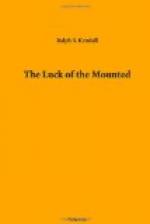The latter made a wry face. “Hell!” he ejaculated disgustedly, “it’s a ‘Savage’ this—thirty-two at that!” He lowered his voice. “The other was a thirty-eight Luger—what?”
“Time an’ agin,” Slavin was declaiming in impotent rage and with upraised fist,—“Time an’ ag’in—have we shtruck a lead on this blasted case—on’y tu find ut peter out agin. . . . Oh! how long, O Lord? how long? . . .”
MacDavid stopped in turn. “Here’s th’ other two, Sarjint,” he said. Slavin dropped the shells into his pocket and for a space he remained in deep thought. Then he turned to the trader.
“Morley,” he said quietly, “yu’re not a talker, I know, but—anyways! . . . I ask ye now . . . ye’ll oblige me by shpakin’ av this tu no man—yet awhiles. . . . I have me raysons—onnershtand?”
The eyes of the two men met, and question and answer were silently exchanged in that one significant look.
MacDavid nodded brief acquiescence to the others request. “Aye!” he replied reflectively, “I think I do—now. . . .”
The sergeant turned to his men. “Come on, bhoy!” he said. “Let’s beat ut home. I’m gettin’ hungry.”
They bid the trader adieu, and trudged away in the direction of the detachment. They had covered some quarter of a mile in silence when Slavin, who was in the lead, suddenly halted and whirled on his subordinates with a mirthless laugh.
“Windy Moran, begod!” he burst out, “mind fwhat he said that day ’bout Gully an’ that dep’ty sheriff bizness? . . . not so——’Windy’ afther all, I’m thinkin’, eh?”
For some few seconds they stared at him, aghast. They had forgotten Moran.
“Say, Burke, though?” ejaculated Yorke incredulously. “Good God! somehow the thing seems impossible . . . not the ‘sheriff’ business so much . . . the other—Gully!—a J.P.—a man of his class and standing! . . . Why! whatever motive—”
“He may have two guns,” broke in Redmond.
“Eyah,” agreed Slavin, grimly, “he may. . . . A Luger’s a mighty diff’runt kind av a gun tu other authomatics . . . an’ th’ man that shot Larry Blake ain’t likely tu be fule enough tu risk packin’ ut around—for a chance tu thrip um up some day.”
For awhile the trio cogitated in silence; each man striving desperately to arrive at some logical solution to the extraordinary problem that now faced them.
“Bhoys!” said Slavin presently, “there’s no doubt there is . . . somethin’ damnably wrong ‘bout all this. But, all th’ same, fact remains, ye cannot shtart in makin’ th’ Force a laughin’ stock by charrgin’ a man av Gully’s position wid murdher—widout mighty shtrong evidence tu back ut. An’ sizin’ things up—fwhat have we got, afther all, . . . right now . . . tu shwear out a warrant on? . . . Nothin’, really, ’cept that he’s shown us he’s a bad man wid a gun! A damned bad break that was, tho’, an’ I’ll bet he’s sorry for that same, tu. Mind how he kept on thravellin’, widout comin’ back tu shpake wid us?”




